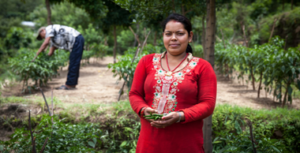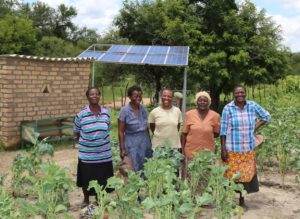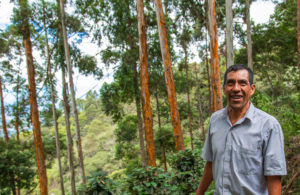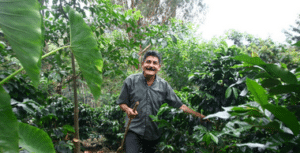Climate change is happening. The situation can feel overwhelming. But there are small, achievable changes we can all make in our lives to lessen the impact. Start today. Find out what you can do right now to help with climate change.
Climate change won’t wait. We’ve arrived at a fork in the road and we need to join together to act, now.
We can all contribute in small ways by reducing our personal carbon footprint to help mitigate the speed and effects of climate change. Here are some ideas of changes we can make in our lives that have an impact.
We can make a difference! Let’s show the world what’s possible when we come together to take action.
What can I do about climate change?
There are many online lists of actions you can take to help slow climate change – we’ll cover some of them on this page. We hope you’ll spot one or two that fit into your lifestyle or circumstances, or prompt you to find out more.
1. Change your diet
A diet rich in plant-based foods is a good choice when it comes to contributing to reducing climate change. In fact, it’s estimated that by reducing your consumption of animal protein by half, you can cut your diet’s carbon footprint by more than 40%.

For Baha in Nepal, where climate change has made farming more difficult, green beans are both a healthy part of her family’s diet and a source of income.
Beef production alone requires 20 times more land and emits 20 times more greenhouse gas emissions per unit of edible protein than common plant-based proteins such as beans, peas and lentils.
It’s not just the (now infamous) cows’ burping of methane gasses that is the problem! The diet that is often fed to livestock – maize and soy – are potential sources of food in themselves. Meanwhile, animals require a lot of water and other resources, and some of the land used for livestock is the result of clearing forests.
You don’t need to go vegetarian or vegan to make a difference. Small shifts in diet choices can make a huge impact globally and having a more flexible diet as a ‘flexitarian’ can really help.
Buying local, seasonal produce is a great idea too – it cuts down on the energy used to transport and store your food before it hits your plate.
2. Travel smarter
Over the last couple of years, led by the Covid-19 pandemic, the Zoom meeting has become a new concept reducing physical travel, but virtual working can also reduce carbon emissions.
Getting rid of your car can reduce your emissions by about a quarter of the average yearly emissions contributed by each person in the developed world. Choosing the most efficient vehicle and going electric where possible can make a big difference.
Flying less has an even greater impact. A transatlantic round-trip by air releases about 1.6 tonnes of CO2 – that’s almost as much as the average annual emissions of many people in the developing world.
There’s no need to become a hermit or forgo all overseas travel. Start by looking at your usual schedule and identifying opportunities where you can make small, regular changes that add up to something bigger. For example, maybe you could cycle to work once a week, rather than driving.
3. Switch to a green energy supplier

These farmers in Zimbabwe are using solar-power to pump groundwater up to the surface to irrigate their crops during droughts.
The costs of solar panels fell 73% between 2010 and 2017, making solar energy the cheapest source of electricity in Latin America, Asia and Africa.
In the UK, solar and onshore wind is expected to be the cheapest source of energy by 2025.
The simplest and most impactful thing we can all do to reduce our carbon footprint is to review our energy use and switch to the greenest solutions. Even if you’ve already switched to electricity generated from renewable sources, it’s still worth investigating new options that are emerging for gas and even oil.
Ecotricity are offering to donate up to £60 to our work if you switch your electricity and/or gas to them. Ecotricity generates all their electricity from wind and sun parks around Britain. It’s also certified vegan. Their gas is a mix of carbon-neutralised natural gas and sustainable green gas. Instead of paying dividends they invest your bills in building new forms of green energy.
4. Shop differently
The fashion industry alone represents around 8-10% of global carbon emissions and nearly 20% of waste water. This has led to a slow fashion movement to reduce the rapid turnover of clothing, as well as an increased focus on what our clothes are made of. Did you know that a polyester shirt has more than double the carbon footprint of a cotton shirt?
Embrace (or dabble in) minimalism by investing in fewer, more environmentally friendly items.
5. Share the voices of those on the front line of climate change
The stories and articles we share with friends and family via email or social media make a difference. If you see an interesting social media post about climate change or green solutions, share it so folks in your network see it too.
Every week, we bring you stories of people living in communities on the front line of climate change. People like Melanio (pictured) in Peru. Floods, made worse by climate change, were damaging lives and livelihoods in Melanio’s community. He learned that reforestation could protect from flooding by strengthening the soil and slowing flood waters. Now he’s joining with others to plant trees and restore the natural habitat.
Help spread the word about the impact of the climate crisis on those hardest hit by sharing stories like Melanio’s with your network. Sharing the problems people face can help raise awareness of the issues, but also of local solutions that work, which can help these ideas spread.

In Peru, Melanio is replenishing the forest to help protect his community from floods
Resources to help
It’s easy to feel overwhelmed in the face of a challenge with the magnitude of the climate emergency. As individuals, we may not know where to begin – or what changes really make a difference.
The Count Us In project is aiming to inspire one billion people to significantly reduce their own pollution and to challenge world leaders to deliver global change. Count Us In is building the world’s largest community of people, organisations and platforms taking practical action on climate change. They’ve identified 16 Steps with experts from the UN Environment Programme based on 3 criteria: their impact on your personal carbon pollution, their power to influence leaders and their ability to involve everyone.
The United Nations also have a campaign ‘#ActNow’ for individual action with an app to track individual actions, with 10 clear ideas to make a difference. They include saving energy at home, throwing away less food, choosing eco-friendly products and speaking up. Every lifestyle choice we make has an impact and you can calculate yours by using the United Nations Climate Change Lifestyle Calculator.
Which measures help climate change the most?
In 2017 a study by Lund University in Sweden and by the University of British Columbia in Canada ranked 148 possible individual actions on climate change according to their impact. These were ranked by their impact on reducing emissions.
The most effective they found was to have one fewer child, with an average in developed countries of 58.6 tonnes of CO2-equivalent emission reductions per year. This compared to living car free (2.4 tonnes), avoiding air travel (1.6 tonnes saved per roundtrip transatlantic flight), and eating a plant-based diet (0.8 tonnes).
The study found that there was a lot of focus on lower impact actions and called for more education and better communication to promote the most effective emission reductions strategies.
Can I really help to slow climate change?
Yes, through your actions but also by setting an example. There can be a groundswell of opinion and we can all make a difference.
Climate pioneers around the world are adapting and thriving in the toughest of conditions. Let’s join with them by making small changes in our own lives that can make a difference to people at the sharp end of the climate crisis. Together, we can show the world what’s possible when we unite to take positive action.

